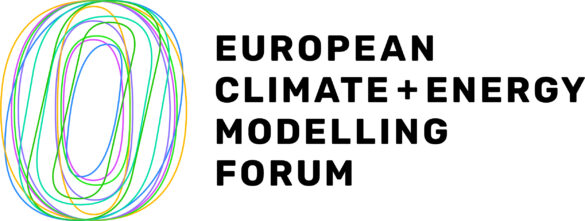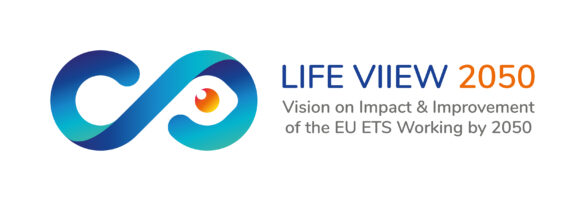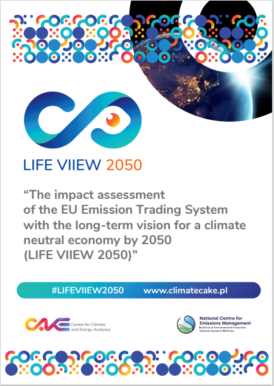Members of LIFE VIIEW 2050 Advisory Board:
Dr Jos Delbeke holds the first EIB Chair on Climate Policy and International Carbon Markets at the European University Institute and was previously Director-General of the European Commission’s DG for Climate Action (2010-2018). Jos Delbeke was involved in setting the EU’s climate and energy targets for 2020 and 2030, and in developing EU legislation on the Emissions Trading System (ETS), cars and fuels, air quality, emissions from big industrial installations and chemicals (REACH). He developed Europe’s International Climate Change strategy and was the European Commission’s chief negotiator at the UNFCCC Conference of the Parties, playing a key role in the EU’s implementation of the Kyoto Protocol and in negotiations on the Paris Agreement.
Dr Simone Borghesi, Director of FSR Climate, the research group on climate change of the Robert Schuman Centre at the European University Institute, and Full Professor of Economics at the University of Siena. He is President of the Italian Association of Environmental and Resource Economists (IAERE). He is also Secretary General of the Policy Outreach Committee of EAERE, the European Association of Environmental and Resource Economists. He received a M.Sc. in Economics at University College London (1996) and a Ph.D. in Economics at the European University Institute (2001). He worked at the International Monetary Fund, Washington (1998), at the Fondazione ENI Enrico Mattei, Milan (1999) and as Assistant Professor at the University of Pescara (2004-2008). He has been visiting scholar at INRA – Institute National de la Recherche Agronomique, Grenoble (2013), at the Department of Land Economy of the University of Cambridge (2015) and at the Center of Economic Research of the ETH, Zurich (2016).
Mr. Wojciech Burkiewicz, Deputy Director in the EU Economic Department since 2018, is responsible for assisting Polish EU Sherpa in areas of climate and energy. He was graduated from the Warsaw School of Economics, where he specialized in econometrics and in international affairs. In 2004 he has joined Polish European Office (currently a part of the Chancellery of the Prime Minister). He has worked on providing analyses and advises to Polish government in the negotiations of the New Financial Perspectives 2007-2013, the Treaty of Lisbon, climate-energy package 2013-2020, EU’s position for the global climate negotiations (COP 15) and the Multiannual Financial Framework 2014-2020. He was also posted to Polish Embassy in London where he headed Economic Section.
Dr Karsten Neuhoff, leads the Climate Policy Department at the German Institute for Economic Research (DIW Berlin) and is Professor at the Institute for Economics and Law of Technical University Berlin. He holds a PhD in Economics from Cambridge University and Master in Physics from Heidelberg University. His research focus on the economics and financing of a low-carbon transformation in the power, industry and building sector. He investigates how policies and markets can be designed to achieve carbon neutrality. In research and advice projects for national governments, EU Commission and international organizations and as board member of the research network Climate Strategies he brings together multi-disciplinary teams and engages stakeholders to enhance quality, relevance, and uptake of the research. He (co-)authored the books “Planetary Economics: Energy, Climate Change and the three domains of sustainable development” and “Climate Policy after Copenhagen – The Role of Carbon Pricing.”
Dr Artur Runge-Metzger, former Director, European Commission, Brussels. Until his retirement in early 2021, his responsibilities covered international climate science in the context of the IPCC and international cooperation on modelling, developing domestic and international climate strategies, including the European Green Deal, 2030 climate target plan, EU Covid recovery and resilience program aiming at making the EU climate neutral by 2050. He oversaw the overall governance incl. monitoring progress of climate action in the EU, regulating greenhouse gas emissions from non-ETS sectors including buildings, road transport including decarbonising fuels, land use, land use change and forestry, waste, carbon capture, use and storage as well as supporting innovation and modernisation in the EU’s energy and industrial sectors, e.g. setting up the Innovation and Modernisation Fund. He served on the Board and Bureau of the European Environment Agency and the Steering Board of the European Fund for Strategic Investments (EFSI) at the European Investment Bank. Until the conclusion of the Paris agreement in 2015, he led on international climate negotiations and climate strategy for the European Union. During this time, he co-chaired the Ad-hoc working group preparing the Paris agreement in 2013/14 and served as Vice-President of the UNFCCC Bureau from 2010-12. Until mid-2003, he occupied various Commission assignments in Sarajevo, Brussels and Harare. Until 1993, he conducted research at the Savannah Agricultural Research Institute in Ghana and lectured economics of agricultural development and natural resources at the Georg August University of Göttingen. He holds a doctoral degree in agricultural economics.
Dr Antonio Soria, Head of Unit Economics of Climate Change, Energy and Transport at the European Commission Joint Research Centre. He holds a PhD in Energy Engineering at the Universidad Politécnica de Madrid and Msc in Economics from Universidad Nacional de Educacion a Distancia.
Dr Stefano F. Verde, Assistant Professor in the Department of Economics and Statistics at the University of Siena. Before joining the University of Siena, he was Deputy Director of the Florence School of Regulation – Climate. He holds a BA in Economics (2006) from the University of Rome ‘Tor Vergata’, an MSc in Economics (2007) from Trinity College Dublin (Ireland), and a PhD in Economics (2013) also from Trinity College Dublin.Verde is specialises in climate change policy, notably in carbon pricing instruments (emissions trading and carbon taxation), their implications both at the domestic and international level. More broadly, his research include public, environmental and energy economics. He has participated in several research projects, with (co-)leading roles in LIFE DICET (Deepening International Cooperation on Emissions Trading), LIFE SIDE (Supporting the Implementation and Development of the EU ETS), and FRESCO – the future of renewable energy communities.
Poland net-zero 2050. Transformation of the Polish and EU Energy Sector until 2050. (June 2022)
 Polska net-zero 2050. Transformacja sektora energetycznego Polski i UE do 2050 r. (2.3 MiB, 2,641 hits)
Polska net-zero 2050. Transformacja sektora energetycznego Polski i UE do 2050 r. (2.3 MiB, 2,641 hits)
 Poland net-zero 2050. Transformation of the Polish and EU Energy Sector until 2050. Summary. (1.1 MiB, 1,244 hits)
Poland net-zero 2050. Transformation of the Polish and EU Energy Sector until 2050. Summary. (1.1 MiB, 1,244 hits)
Poland net-zero 2050. The role of Public Transport in the context of the “Fit for 55” package to 2050. (June 2022)
 POLSKA NET-ZERO 2050: Rola transportu publicznego w świetle pakietu „Fit for 55” i perspektywy roku 2050. (1.6 MiB, 1,285 hits)
POLSKA NET-ZERO 2050: Rola transportu publicznego w świetle pakietu „Fit for 55” i perspektywy roku 2050. (1.6 MiB, 1,285 hits)
 Poland net-zero 2050. The Role of Public Transport in the context of the “Fit for 55” package to 2050. Summary. (763.9 KiB, 814 hits)
Poland net-zero 2050. The Role of Public Transport in the context of the “Fit for 55” package to 2050. Summary. (763.9 KiB, 814 hits)
Poland net-zero 2050. Selected instruments for climate policy implementation in Agricultural Sector in the 2050 perspective. (June 2022)
 POLSKA NET-ZERO 2050: Wybrane instrumenty wdrażania polityki klimatycznej w sektorze rolnictwa w perspektywie roku 2050. (1.3 MiB, 1,285 hits)
POLSKA NET-ZERO 2050: Wybrane instrumenty wdrażania polityki klimatycznej w sektorze rolnictwa w perspektywie roku 2050. (1.3 MiB, 1,285 hits)
 Poland net-zero 2050. Selected Instruments for Climate Policy Implementation in Agricultural Sector in the 2050 Perspective. Summary. (647.4 KiB, 681 hits)
Poland net-zero 2050. Selected Instruments for Climate Policy Implementation in Agricultural Sector in the 2050 Perspective. Summary. (647.4 KiB, 681 hits)
“How to compute the cost for workers within the “Just Transition” to a low-carbon future?” (April 2022)
 How to compute the cost for workers within the “Just Transition” to a low-carbon future? (1.1 MiB, 759 hits)
How to compute the cost for workers within the “Just Transition” to a low-carbon future? (1.1 MiB, 759 hits)
„Reform of the market stability reserve (MSR) in the “Fit for 55” package“ (January 2022)

 Reform of the market stability reserve (MSR) in the “Fit for 55” package (2.3 MiB, 1,088 hits)
Reform of the market stability reserve (MSR) in the “Fit for 55” package (2.3 MiB, 1,088 hits)
„Polska net-zero 2050. Podręcznik Transformacji Energetycznej dla Samorządów.” (październik 2021)
 Polska net-zero 2050. Podręcznik Transformacji Energetycznej dla samorządów. (2.0 MiB, 1,110 hits)
Polska net-zero 2050. Podręcznik Transformacji Energetycznej dla samorządów. (2.0 MiB, 1,110 hits)
„Poland net-zero 2050: The roadmap toward achievement of the EU climate policy goals in Poland by 2050“ (July 2021)

 Polska net-zero 2050: Mapa drogowa osiągnięcia wspólnotowych celów polityki klimatycznej dla Polski do 2050 r. (7.5 MiB, 4,547 hits)
Polska net-zero 2050: Mapa drogowa osiągnięcia wspólnotowych celów polityki klimatycznej dla Polski do 2050 r. (7.5 MiB, 4,547 hits)
 “Poland net-zero 2050. The roadmap toward achievement of the EU climate policy goals in Poland by 2050. Summary.” (775.7 KiB, 1,888 hits)
“Poland net-zero 2050. The roadmap toward achievement of the EU climate policy goals in Poland by 2050. Summary.” (775.7 KiB, 1,888 hits)
“CO2 emission reduction paths in the transport sector in Poland in the context of the European Green Deal” (October 2020)
 Ścieżki redukcji emisji CO2 w sektorze transportu w Polsce w kontekście „Europejskiego Zielonego Ładu” (2.2 MiB, 1,609 hits)
Ścieżki redukcji emisji CO2 w sektorze transportu w Polsce w kontekście „Europejskiego Zielonego Ładu” (2.2 MiB, 1,609 hits)
 The CO2 emission reduction paths in the transport sector in Poland in the context of The European Green Deal (1.3 MiB, 1,177 hits)
The CO2 emission reduction paths in the transport sector in Poland in the context of The European Green Deal (1.3 MiB, 1,177 hits)
“The effects of the implementation of the Border Tax Adjustment in the context of more stringent EU climate policy until 2030” (September 2020)
 The effects of the implementation of the Border Tax Adjustment in the context of more stringent EU climate policy until 2030 (2.0 MiB, 1,873 hits)
The effects of the implementation of the Border Tax Adjustment in the context of more stringent EU climate policy until 2030 (2.0 MiB, 1,873 hits)
 Skutki wprowadzenia podatku granicznego od emisji GHG w warunkach zaostrzania polityki klimatycznej UE do 2030 r. (1.4 MiB, 2,081 hits)
Skutki wprowadzenia podatku granicznego od emisji GHG w warunkach zaostrzania polityki klimatycznej UE do 2030 r. (1.4 MiB, 2,081 hits)
“Assessing climate policy impacts in Poland’s agriculture. Options overview” (July 2020)
 Assessing climate policy impacts in Poland’s agriculture. Options overview.pdf (1.2 MiB, 3,138 hits)
Assessing climate policy impacts in Poland’s agriculture. Options overview.pdf (1.2 MiB, 3,138 hits)
 Ocena wpływu polityki klimatycznej na sektor polskich gospodarstw rolnych. Podsumowanie.pdf (933.7 KiB, 1,663 hits)
Ocena wpływu polityki klimatycznej na sektor polskich gospodarstw rolnych. Podsumowanie.pdf (933.7 KiB, 1,663 hits)
“The European Green Deal impact on the GHG’s emission reduction target for 2030 and on the EUA prices” (March 2020)
 CAKE_Zmiana-celów-redukcyjnych-i-cen-uprawnień-do-emisji-wynikająca-z-komunikatu-Europejski-Zielony-Ład.pdf (1.3 MiB, 3,141 hits)
CAKE_Zmiana-celów-redukcyjnych-i-cen-uprawnień-do-emisji-wynikająca-z-komunikatu-Europejski-Zielony-Ład.pdf (1.3 MiB, 3,141 hits)
 CAKE_The-European-Green-Deal-impact-on-the-reduction-target-for-2030-and-on-the-EUA-prices.-Summary.pdf (1.0 MiB, 2,423 hits)
CAKE_The-European-Green-Deal-impact-on-the-reduction-target-for-2030-and-on-the-EUA-prices.-Summary.pdf (1.0 MiB, 2,423 hits)
“Scenarios of low-emission energy sector for Poland and the EU until 2050” (October 2019)
 Scenarios of low-emission energy sector for Poland and the EU until 2050 (2.5 MiB, 2,368 hits)
Scenarios of low-emission energy sector for Poland and the EU until 2050 (2.5 MiB, 2,368 hits)
 Scenariusze niskoemisyjnego sektora energii w Polsce i UE w perspektywie 2050 r. Podsumowanie. (1.1 MiB, 2,552 hits)
Scenariusze niskoemisyjnego sektora energii w Polsce i UE w perspektywie 2050 r. Podsumowanie. (1.1 MiB, 2,552 hits)
“CO2 emissions reduction potential on transport sector in Poland and the UE until 2050” (October 2019)
 CO2 emissions reduction potential in transport sector in Poland and the EU until 2050 (3.4 MiB, 3,390 hits)
CO2 emissions reduction potential in transport sector in Poland and the EU until 2050 (3.4 MiB, 3,390 hits)
 Potencjał redukcji emisji CO2 w sektorze transportu w Polsce i UE w perspektywie 2050 r. Podsumowanie (1.3 MiB, 1,949 hits)
Potencjał redukcji emisji CO2 w sektorze transportu w Polsce i UE w perspektywie 2050 r. Podsumowanie (1.3 MiB, 1,949 hits)
“The risk of Carbon Leakage in the context of increasing the EU greenhouse gas emission reduction target” (June 2019)
 The risk of Carbon Leakage in the context of increasing the EU Greenhouse Gas Emission reduction taget (3.2 MiB, 2,693 hits)
The risk of Carbon Leakage in the context of increasing the EU Greenhouse Gas Emission reduction taget (3.2 MiB, 2,693 hits)
 Podsumowanie raportu Ryzyko ucieczki emisji w kontekście zwiększenia celu redukcji emisji gazów cieplarnianych UE (849.6 KiB, 2,307 hits)
Podsumowanie raportu Ryzyko ucieczki emisji w kontekście zwiększenia celu redukcji emisji gazów cieplarnianych UE (849.6 KiB, 2,307 hits)

On 1st May 2021 the €5 million, four-year project, the “European Climate and Energy Modelling Forum” was launched. The aim of the project is to establish a new European institution – the forum – to tackle the key challenge of our time – how to achieve climate neutrality. This project has received funding from the European Union’s Horizon 2020 research and innovation programme (No 101022622). Institute of Environmental Protection – National Research Institute / KOBiZE / CAKE is part of the consortium and a co-beneficiary of the project.
The forum will bring together energy and climate researchers and policy makers working across Europe to build a coherent and robust policy-relevant evidence base to address climate neutrality.
With an exciting programme of stakeholder engagement, policy and research activities, the project will identify critical policy-relevant research questions that will then be addressed by the forum. An ambitious model comparison exercise involving the 20 models developed and maintained by the project members, together with those of newly recruited forum members, will form the core of a research programme which tackles the role of the demand and supply side, behaviour and the EU in the global policy context. The project will also develop novel open digital infrastructure to support the hosting, communication and discussion of scenarios, models, assumptions and results.
The project kick-off meeting hosted over 50 participants from the 15 project partners as well as technical, communications and policy experts. Two members of the international advisory board, Prof. John Weyant of the Stanford Energy Modelling Forum, and Prof. Shinichiro Fujimori, Kyoto University shared their experience of the value of model comparison exercises and provided inspiration for the forum.
The ECEMF consortium is led by KTH Royal Institute of Technology, and consists of 15 partners in total from 9 countries including CMCC, IIASA, PIK, TU Wien, e-think, TNO, Fraunhofer ISI, E3M, PBL, Artelys, Comillas, TU Delft, University of Melbourne and IOŚ-PIB.
The role of IOŚ-PIB/KOBiZE/CAKE in the ECEMF project include work in the 2 working packages:
– Involvement in developing scenarios and conducting analysis
-Use and update of MEESA model
-Involvement in developing and implementing a detailed communication plan and build a stakeholder network
-Workshops – including one meeting with Polish Goverment.
More information about the project you can find at the website ECEMF & Twitter: @ECEMF_2020



You are kindly welcome to take the survey, that contributes to the most adequate adaptation of IOŚ-PIB/KOBiZE/CAKE activities under the LIFE VIIEW 2050 project to stakeholders’ expectations („The impact assessment of the EU Emission Trading System with the long-term vision for a climate neutral economy by 2050” – LIFE VIIEW 2050 – LIFE19 GIC/PL/001205″).
Information about the LIFE VIIEW 2050 project
More information on the project are here: https://climatecake.ios.edu.pl/aktualnosci/new-cake-project-life-viiew-2050/?lang=en

On the 4th March 2021, the first meeting of the Advisory Board took place. The meeting was held online. The meeting was attended by representatives of the Advisory Board and representatives of the LIFE VIIEW 2050 project.

LIFE VIIEW 2050 Advisory Board memebers:
The meeting was moderated by Robert Jeszke, LIFE VIIEW Project Coordinator. Following introductions of the Advisory Board and the Project Team members, Robert briefly explained modus operandi of the Advisory Board and the expected support to the LIFE VIIEW 2050 Project Team.
This introduction was followed with a more detailed presentation by Marta Rosłaniec on LIFE VIIEW 2050 scope, the role, and expected input from the Advisory Board. The project is expected to provide scenarios supporting policies and measures leading to decarbonisation in 2050, focusing on both, EU ETS and non-ETS and offering a broader International perspective. To this end, several modelling tools will be used to validate various combinations of the proposed measures to achieve the 2050 goal, with interim goals in 2030 and later.
Later, there was a discussion on scenarios and options on the way forward for the Project.
More information about the LIFE VIIEW 2050 project you can find here:
 LIFE VIIEW 2050 LEAFLET (2.2 MiB, 686 hits)
LIFE VIIEW 2050 LEAFLET (2.2 MiB, 686 hits)
